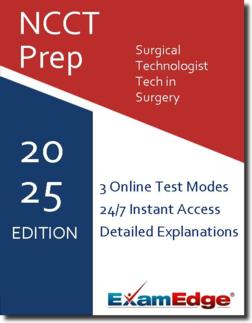NCCT Surgical Technologist - Tech in Surgery (TS-C) Practice Tests & Test Prep by Exam Edge - Blogs
Based on 20 Reviews
- Real Exam Simulation: Timed questions and matching content build comfort for your NCCT Surgical Technologist - Tech in Surgery test day.
- Instant, 24/7 Access: Web-based NCCT Surgical Technologist practice exams with no software needed.
- Clear Explanations: Step-by-step answers and explanations for your NCCT exam to strengthen understanding.
- Boosted Confidence: Reduces anxiety and improves test-taking skills to ace your NCCT Surgical Technologist (TS-C).



